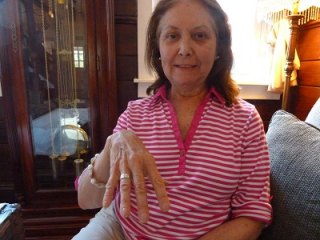About twenty years ago, Victoria Gonzales Blair lost a silver and turquoise ring beneath the deck boards of Blackbeard's Lodge porch, while making a call from the pay phone. "Stupid me, I was playing with the ring," said Blair.
The ring had little monetary value. "I'm sure it cost less than $5," said Blair. "Every time I look at the ring, I thought of Spain. Oh, I was so sad." She'd worn it since 1968, when she and her younger sister were traveling on a tight budget, saying goodbye to the country she called home between the ages of 19 and 27.

A longtime vacationer who always stays at Blackbeard's Lodge, Blair went about her life, eventually purchasing a similar, inexpensive ring to replace the keepsake she cherished. She never forgot the original ring. "Every time I come I ask," said Blair.
Last year, Dan Robinson and the crew at Blackbeard's changed some decking, and did some crawling around. They uncovered "a fortune in quarters," said Robinson, and Blair's ring. "We kept it in a box," said Robinson.
Blair was delighted. The ring, missing much of the turquoise which once adorned it, is now stacked with her replacement ring, and still reminds her of Spain.
"I belong to three countries," explained Blair, whose life has been shaped by revolution. Born in Havana, Cuba, Blair attended boarding school in Salamanca, Spain between the ages of 11 and 15, returned to Spain in her 20s, and has lived in the US, working as an educator, since the 1968 trip when she purchased her keepsake.
Her parents were living in Madrid when the Spanish Civil War erupted in 1936. "My father fought in the civil war against Franco," said Blair. When Franco's Nationalist forces took control of the country in 1939, Señor Gonzales was sent to a POW camp in France.
Returning to Spain was not an option, and Gonzales shipped out to Cuba, where his sister Victoria was living. Blair's mother and sister left Madrid and met her father in Havana. "Nine months later I was born," said Blair.
Her mother died of melanoma when Blair was three and a half years old, leaving the (now three) sisters in the care of their Tìa Victoria. Gonzales built a large, successful business selling American printing machinery to Cuban newspapers.
When the Cuban Revolution broke out, Gonzales initially supported Castro, investing his resources in the new government "because Cuba took him in," said Blair. When Castro appointed Che Guevara, a declared communist, to be President of the National Bank, Gonzales recognized a threat to his family, and fled to New Orleans.
"My father said, 'This is going to be a rat trap. We have to get out,'" recalled Blair. "I was 17 when the revolution started and at 19 I left Cuba forever."
The former head of the National Bank and also a disillusioned revolutionary, Felipe Pazos helped Gonzales procure the documents to escape the country. "I cannot tell the story without goose bumps," said Blair. "That man saved our lives."
With his contacts in the American printing world, Gonzales once again started afresh, selling equipment to South American countries like Venezuela and Colombia. After one trip abroad, US officials denied Gonzales re-entry to the country because of his Cuban passport. The family settled once more in Madrid.
"I had an adventuresome life," said Blair. It is easy to picture her as an elegant and playful young woman. She enjoyed fiestas in Madrid and a romance in Switzerland.
When Franco's health began declining, the family grew concerned about the outbreak of another civil war in Spain. Blair's older sister was already living in New York, and the family decided to immigrate. "I cried and cried," said Blair.
Before crossing the Atlantic one more time to start a new life, she and her sister took the trip across Spain to say goodbye to the country they loved. Blair bought a cheap ring as a memento of the life she was leaving.
In the US, Blair married, raised a family, worked for 24 years in Montgomery County, Maryland public schools and found a beautiful island on which to vacation. She carries the history of her other life on her finger.